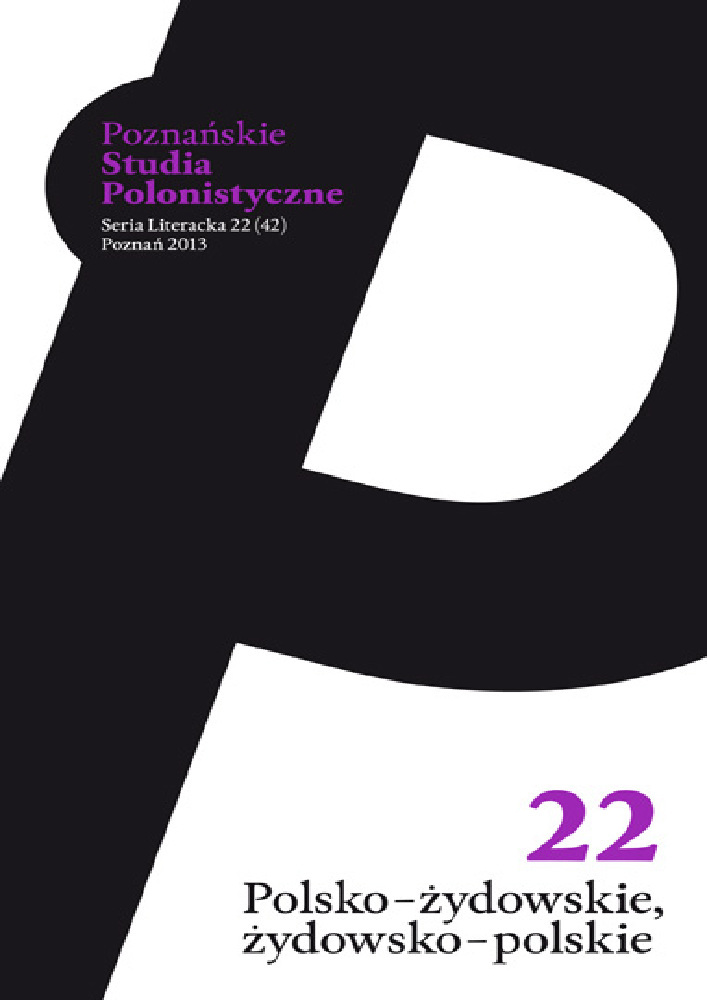Abstract
The article is an interpretation of the eponymous long poem from Tadeusz Różewicz’s volume nożyk profesora [professor’s knife]. The first part discusses the modes modes of narration of the experience of the Holocaust. The discussion focuses on meanings of the words “memory” and “history”, on the ironic use of pastoral convention, and on the transformation of the metaphor from Cyprian Norwid’s Przeszłość [The Past]. The poem recycling from the volume zawsze fragment. recycling is an important context. The second part of the article is devoted to the friendship between Tadeusz Różewicz and Mieczysław Porębski. The description of the friends’ breakfast points out to an interpretation of their relation in the context of their wartime biography: a death camp for Porębski, and resistance fighting for Różewicz. The poet, in spite of his memory and long-time friendship with the former prisoner, presents the Holocaust as a mediated experience that is virtually inaccessible. However, in many ways he still tries to bring it closer to the reader and does not let the reader forget it.
References
Barańczak S., Norwid: obecność nieobecnego, w: idem, Tablica z Macondo, Londyn 1990.
Cieślak R., Palimpsesty pamięci – estetyczne ślady obrazu wojny w twórczości Tadeusza Różewicza. Próba analizy fenomenologicznej, w: Wojna i postpamięć, red. Z. Majchrowski, W. Owczarski, Gdańsk 2011.
Głowiński M., Norwida wiersze-przypowieści, Ciemne alegorie Norwida, w: idem, Prace wybrane, t. 5: Intertekstualność, groteska, parabola. Szkice ogólne i interpretacje, Kraków 2000.
Janion M., To, co trwa, „Twórczość” 2000, nr 5.
Kłosiński K., Imię Róży, „Pamiętnik Literacki” 1999, z. 1.
Kunz T., Strategie negatywne w poezji Tadeusza Różewicza. Od poetyki tekstu do poetyki lektury, Kraków 2005.
Różewicz T., nożyk profesora, Wrocław 2001.
Różewicz T., Zwierciadło. Poematy wybrane, wybór, wstęp M. Porębski, Kraków 1998.
Skrendo A., Tadeusz Różewicz i granice literatury. Poetyka i etyka transgresji, Kraków 2002.
Szczukowski D., Zagłada a doświadczenie literatury, w: idem, Tadeusz Różewicz wobec niewyrażalnego, Kraków 2008.
Szymborska W., Koniec i początek, Poznań 1996.
Śniedziewski P., Mallarmé – Norwid. Milczenie i poetycki modernizm we Francji oraz w Polsce, Poznań 2008.
Ubertowska A., Przepisywanie Zagłady. Szoah w późnych poematach Tadeusza Różewicza, w: Powracając do Różewicza, red. Z . Majchrowski, Gdańsk 2006.
Ubertowska A., Tadeusz Różewicz a literatura niemiecka, Kraków 2001.
Zadura B., Nocne życie, Wrocław 2008.
Zadura B., Wszystko, Wrocław 2008.
Żukowski T., Poezja i peryferie historii, „Res Publica Nowa” 2001, nr 7.
Żukowski T., Zagłada a język poetyki Tadeusza Różewicza, w: Literatura polska wobec Zagłady, red. A. Brodzka, D. Krawczyńska, J. Leociak, Warszawa 2000.
License
Authors
Authors of texts accepted for publication in „Poznańskie Studia Polonistyczne. Seria Literacka” are required to complete, sign and return to the editor's office the Agreement for granting a royalty-free license to works with a commitment to grant a CC sub-license.
Under the agreement, the authors of texts published in „Poznańskie Studia Polonistyczne. Seria Literacka” grant the Adam Mickiewicz University in Poznań a non-exclusive, royalty-free license and authorize the use of Attribution-NoDerivatives 4.0 International (CC BY-ND 4.0)Creative Commons sub-license.
The authors retain the right to continue the free disposal of the work.
Users
Interested Internet users are entitled to use works published in „Poznańskie Studia Polonistyczne. Seria Literacka” since 2016, for non-commercial purposes only, under the following conditions:
- attribution - obligation to provide, together with the distributed work, information about the authorship, title, source (link to the original work, DOI) and the license itself.
- no derivatives - the work must be preserved in its original form, without the author's consent it is not possible to distribute the modified work, such as translations, publications, etc.
Copyrights are reserved for all texts published before 2016.
Miscellaneous
Adam Mickiewicz University in Poznań retains the right to magazines as a whole (layout, graphic form, title, cover design, logo etc.).
